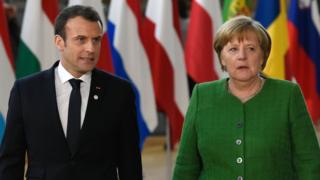 Image copyright
Image copyright
Getty Images
Mr Macron and Mrs Merkel say any cuts to EU programmes could be damaging
EU leaders have agreed to spend more on common defence and security policy in their next long-term budget, European Council President Donald Tusk says.
Leaders of 27 states were meeting in Brussels to shape the 2021-27 budget.
Members have been in disagreement on how to compensate for funding loss after Britain’s planned 2019 departure.
Germany and France have warned any funding cuts to EU programmes could damage efforts to tackle illegal immigration and terrorism.
Speaking after the meeting, Mr Tusk said leaders had agreed to spend more on security, as well as fighting illegal migration in their next long-term budget.
He said many of the EU leaders were ready to contribute more to the pot, but acknowledged others were less forthcoming.
Deciding how to fill the budgetary hole that Brexit will leave is problematic, says the BBC’s Kevin Connolly, as net contributors such as Austria and the Netherlands take a sharply different view from net beneficiaries such as Poland and Greece.
Image copyright
AFP
The summit is focusing on the future leadership and budget of EU institutions
While wealthier Northern countries make the case for a reduced budget, poorer member states in eastern and southern Europe are unhappy about the possibility of cuts to programme funding.
Ahead of Friday’s talks, European Commission President Jean-Claude Juncker had said he was concerned about a “rift between east and west”. “Sometimes it gets wider and sometimes differences are bridged. I don’t want any new divisions in Europe. We’ve had enough of those.”
‘Clear Division’
By Kevin Connolly, BBC News, Brussels
EU budget problems are not fixed in a single afternoon of talks – agreeing how much the organisation should collect from member states after Brexit will take months.
There’s a clear division between the rich countries, who don’t want to fix the post-Brexit shortfall by paying more, and the poor countries, who don’t want to bridge it by taking less.
And all the while, like the rumble of gunfire from a neighbouring battlefield, the Brexit issue hangs in the air here.
Plenty of European leaders have said that progress can’t be made until they have more clarity and certainty from the British side.
Separately, it was also announced that the UK Prime Minister Theresa May is to deliver long-awaited speech setting out her vision for the UK’s future relationship with the EU on 2 March.
Speaking on Friday, Mr Tusk said EU leaders planned to push ahead with the release of their own joint stance for future relations in March, whether Britain is ready or not.
He said the bloc would be “extremely realistic in our assessment of possible new proposals”, while labelling the UK’s approach to the negotiations as “pure illusion”.
Brexit: EU leaders debate financial impact of UK’s departure}

